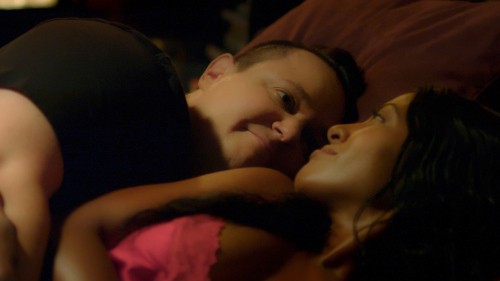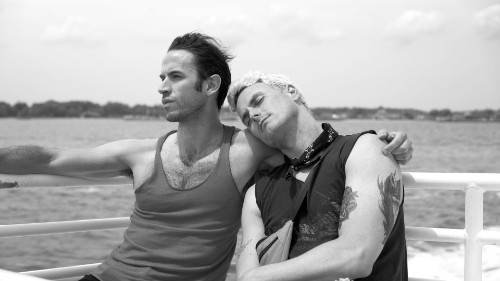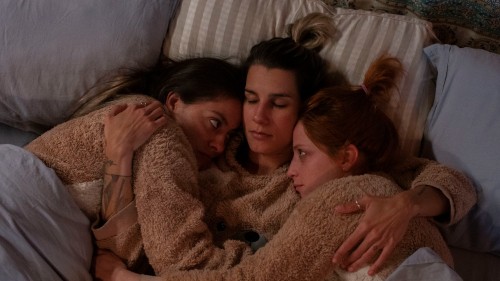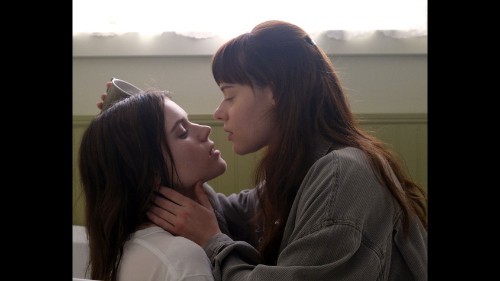The Tel Aviv International LGBTQ Film Festival (TLVFEST) opens this week and will take place from October 27 – November 5, 2022 with an exciting selection of films. The full program and tickets are available on the TLVFEST website.
I’ve seen a few and these are some of my favorites:
Maybe Someday

Having seen and loved S & M Sally, I expected something similar from actor/director Michelle Ehlen – funny, bold, intelligent, nuanced and spiked with satire. Maybe Someday, Ehlen’s first dramatic feature, was not the film I expected, but it is a quietly powerful film – Ehlen dares to go deep, and it is resonant in its depiction of heartbreak, depression, friendship, love and healing. And it’s funny – imbued with Ehlen’s dry humor and the comedy of the human predicament. Maybe Someday is written, directed, edited, and co-produced by Ehlen, who also stars in the film. It is fully her vision.
Ehlen stars as Jay, a non-binary photographer in their 40s, who is reeling following a separation from their wife Lily (Jeneen Robinson). Coming over to Lily’s new apartment for dinner, Jay’s nervous tension and grief are so palpable, it’s almost painful to watch. In contrast, Lily’s composure and genuine affection for Jay make it clear that she has already moved on. Feeling lost, and recognizing the need to do something, Jay decides to move to Los Angeles, to physically distance themselves from the past, and seek out a new beginning. On the way, however, they stop to visit Jess (Shaela Cook), their childhood best friend. Jess is divorced and has a young daughter Ava – Jay’s interactions with Ava are so hilarious, I refuse to spoil the moment with a description. Jay is also still texting with Lily, so, altogether not quite ready to part with the past.
As Jay makes the effort of daily life, their thoughts are full of memories with Lily, and from their adolescence with Jess. Eliza Blair is stunning as the young Jay, and as Jay works through their past relationship with Jess, and first intimations of sexuality, the viewer joins Jay on this journey. The joy and intimacy of their teenage friendship stands in contrast to the tension that sometimes rises to the surface between Jay and Jess, and in those memories is the origin of that tension. Shaela Cook delivers a rich performance as Jess, with a complex mix of understanding and glaring blind spots as she tries to help Jay through this crisis and reflects on the trajectory of their friendship. Bursting through the reflective, intimate, feel of the film is Tommy – an obnoxious, excruciatingly bad comedian that Jay meets on a photo shoot. Charlie Steers is terrific as Tommy, and this most unlikely friendship develops brings light and laughter into Jay’s life, and a fun drag scene into the film.
Wenting Den Fisher’s understated cinematography is in harmony with the film’s overall reflective tone, the beauty of nature is a constant on Jay’s slow path towards acceptance and healing. Ultimately, it is Ehlen’s portrayal of Jay that sears the heart with the eloquence of her gaze and body language, depicting the raw visceral quality of Jay’s pain, the powerful determination, and awkward stumbling steps forward to an unknown future, hoping for joy.
Chrissy Judy

More heartbreak, yet of a different type, and more, much more drag. Todd Flaherty’s Chrissy Judy is full of flair and fun, exquisitely stylized with a distinct New York City/summers in Provincetown vibe. Here too there is a strong sense of vision, Flaherty – who stars as Judy – wrote, directed, edited, and co-produced the film, with his brother Brendan in charge of the gorgeous cinematography in black and white. The love and intimacy of a long-standing friendship is as strong as sexual/romantic love. Judy (Todd Flaherty) has built his entire life and sense of identity around his friendship with Chrissy (Wyatt Fenner). Although they do not live together, they perform together in a drag act and other than sex, share the closeness of a devoted couple. But their act has never quite taken off, and while Judy (his official name is James) seems content to remain a charming mischievous boy well into his thirties, picking up temporary cater-waiter jobs and depressing gigs, Chrissy is already envisioning a different life for himself. When Chrissy tells Judy that he is planning to move in with his boyfriend Sean, who lives in Philadelphia, Judy is shattered. His often-wrong-headed attempts to go it alone are poignant, funny, and always sparkling with effervescent energy. Sometimes he stops to reflect – “I think I must be fucked up because I’ve never had a boyfriend” – but those brief insights soon fade before the lure of more immediate pleasures. Flaherty captures the joys, jealousies, and dilemmas of contemporary gay life – many of which have a universal resonance. The wonderful onscreen connection between Fenner and Flaherty conveys the intimacy of friendship. There is an inevitable sense of loss when your best friend enters a (another) long-term relationship, it takes Judy on a wild, mostly downward spiral – which, of course, he does with spectacular panache, but Fenner is effective in conveying Chrissy’s sorrow as well. Bleached-blonde bad boy though he is, it’s easy to care about this character, and I was rooting for Judy all the way.
Petit Mal

Ruth Caudeli, whose film Leading Ladies was featured at TLVFEST 2021, is back with Petit Mal, a film that captures the intimacies, pleasures, and vulnerabilities of living in a throuple. Caudeli’s creative storytelling is a dominant aspect of the film, which eschews a dramatic narrative trajectory in favor of expressing nuances of emotion and the shifting flow of feelings. The film focuses on Laia (Ruth Caudeli), Martina (Silvia Varón), and Anto (Ana María Otálora), who all look adorable cuddling in matching onesies, farting and laughing together in their big bed. It’s an image of domestic bliss, but there are also undercurrents of tension.
Moving into meta territory, Laia is a film director and goes away to work on a project, shifting the balance of the relationship. Suddenly, they are just two, not three. Even more meta – Martina is filming a documentary about the three of them, about being a throuple. As interviewer, she asks them from behind the camera – what is the most difficult thing about being a throuple? Anto speaks to the logistic aspect – “spending time together equitably”, while Laia looks at the emotions – jealousy, and Martina thinks that “three is not balanced, there are always two or one.” As the three play a guessing game over dinner – there is a sense that Anto has come later into the relationship, because Laia and Martina have memories that she does not share. Is it always two or one? It’s a tricky balance, but perhaps it can be achieved.
If the above description sounds too abstract – it’s not at all. Petit Mal is very visually rich, sensual and playful. Although the camera follows the trio in an almost documentary style, showing the small moments of everyday life, Martina’s film footage and memories are woven into the fabric of the throuple’s lives, creating a fluid sense of time. When Martina and Anto drive back from the airport after dropping Laia off, all the color is literally drained out of them, and the continuous footage remains in black and white, while the interwoven footage is in color. Missing Laia, the third side to their triangle seems at first to pull them apart. Martina and Anto are like lonely ones, who happen to share the same space, rather than two together. Distance and experiencing different people and places alter the relationship with Laia as well, from her perspective as well as the other two. Caudeli plays the harmonies, counterpoint, and shifting rhythms of relationships with warmth, sensitivity, and a great soundtrack.
You Can Live Forever

Anwen O’Driscoll shines as Jaime, a queer teenager who is sent to live with relatives following her father’s death and mother’s breakdown. Aunt Beth (Liane Balaban) and her husband Jean-Francois (Antoine Yared) are devout Jehovah’s Witnesses, and while Jaime lives with them, they have certain expectations of her. Set in the 90s (as is clear when Jaime pulls out one last joint from a cassette case while on the train to Montreal) Jaime’s character really stands out as a young person who is confident in her identity. Another intriguing aspect of this debut film, written and directed by Sarah Watts and Mark Slutsky, is that in contrast to expectations, the film does not portray the two sides – Jehovah’s Witnesses vs. Jaime – as either all good or all evil, saints or sinners in eternal battle against one another. A point of comparison might be The Miseducation of Cameron Post, where there is no compassion or understanding from Cameron’s religious aunt, her community, and certainly not from the conversion therapy center. Make no mistake, Jaime is not out to her relatives. However, there is love and affection on both sides, and a measure of respect for differing beliefs. Beth and Jean-Francois expect her to attend weekly Bible meetings with them and wear a dress, but Beth, in consideration for Jaime’s preferences, finds one without ruffles.
Silently suffering and enduring the religious meeting, Jaime has her eyes on Marike (Jennifer Laporte), who then turns and flashes an inviting smile. Marike’s father is a prominent leader in the community, and Jaime’s relatives are pleased to see a friendship developing between the two girls. Marike is devout, sincerely believing in the tenets of Jehovah’s Witnesses. As Jaime and Marike spend more time together, they navigate their different beliefs and their growing attraction and connection. It’s a delicate balance for Jaime, living in the community with respect, and to a certain extent bound by their restrictions, yet certain in her own beliefs. O’Driscoll and Laporte bring a youthful sensuality and tenderness to this story of young love, their scenes together shimmer with desire, hope, and affection. Watts and Slutsky have crafted an intelligent and captivating film that reflects the complexity and nuances of a young person contending with the differences and contradictions between her feelings and the tenets of her community.





